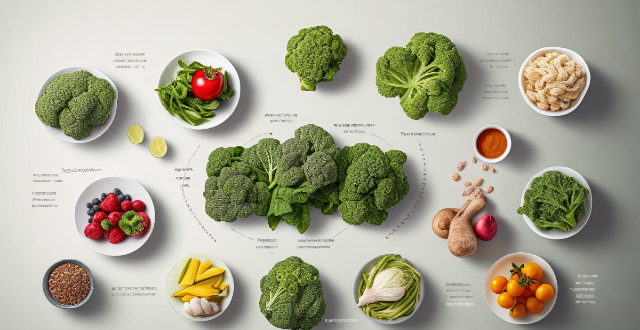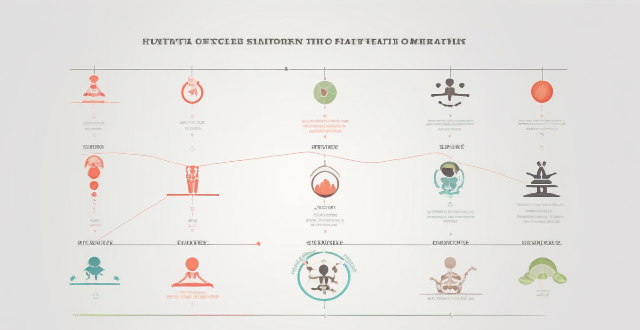Fat Carbohydrate

How can carbohydrate loading benefit endurance athletes ?
Carbohydrate loading, or "carb-loading," is a dietary strategy used by athletes to maximize glycogen storage in muscles and liver for endurance sports. It offers benefits like increased energy availability, enhanced recovery, and mental advantages such as confidence and focus. Implementing this strategy involves reducing training intensity while increasing carbohydrate intake, choosing complex carbs over refined sugars, and maintaining proper hydration and electrolyte balance. While effective for many endurance athletes, individualized planning with a nutritionist is recommended.

What is a good marathon diet plan ?
A good marathon diet plan should provide the necessary nutrients and energy to support an athlete's training and performance during a marathon. It should include a high-carbohydrate diet, protein needs, and healthy fats. A high-carbohydrate diet should provide around 60-70% of total daily calories from carbohydrates, while protein needs should provide around 10-20% of total daily calories. Healthy fats should make up around 20-35% of total daily calories. Good sources of carbohydrates include whole grains, fruits, vegetables, legumes, and low-fat dairy products. Good sources of protein include lean meats, poultry, fish, eggs, nuts, seeds, and plant-based proteins like tofu and tempeh. Good sources of healthy fats include olive oil, avocados, nuts, seeds, fatty fish (such as salmon), and dark chocolate.

What are the potential risks associated with a high-fat diet ?
A high-fat diet, particularly one rich in saturated and trans fats, can pose several health risks. These include an increased risk of cardiovascular disease, obesity and weight gain, type 2 diabetes, liver disease, cancer, and digestive issues. It is essential to maintain a balanced diet that includes healthy fats while limiting the intake of saturated and trans fats found in processed foods and fried foods.

What is the most effective workout routine for losing belly fat ?
The most effective workout routine for losing belly fat depends on individual factors such as age, fitness level, and overall health. Popular routines include HIIT (high-intensity interval training), strength training, and cardiovascular exercises. Tips for making these routines more effective include starting with a warm-up period, choosing enjoyable exercises that can be done for at least 30 seconds each, resting for 1-2 minutes between each burst of exercise or set of exercises, completing 3-4 sets of each exercise, and including at least one day of rest per week to allow muscles to recover.

Are there any specific diets that enhance exercise efficiency ?
Yes, there are specific diets that can enhance exercise efficiency. These include a high-carbohydrate diet for energy, a low-fat diet for weight management and cardiovascular health, a high-protein diet for muscle recovery and maintenance, and a plant-based diet for optimal nutrient intake. Examples of foods in each diet category are provided, along with the benefits they offer for exercise efficiency. It is recommended to consult with a healthcare professional before starting any new diet plan.

Are there any specific diets recommended for people with diabetes ?
The text discusses recommended diets for people with diabetes, including the Mediterranean diet, DASH diet, vegetarian or vegan diets, low carbohydrate diets and focusing on portion control and mindful eating. It emphasizes the importance of working with a healthcare professional to determine the best dietary approach based on individual needs and preferences.

What are the best practices for sports nutrition in managing a healthy lifestyle ?
Sports nutrition is key to managing a healthy lifestyle. Best practices include staying hydrated, eating a balanced diet with carbohydrates and protein, choosing healthy fats, timing meals around workouts, using supplements cautiously, and prioritizing recovery through rest and proper post-workout nutrition. Consulting with a registered dietitian or healthcare professional can provide personalized advice.

Are there any specific training methods that celebrities use for muscle building and fat loss ?
Celebrities use a variety of training methods and nutrition plans to achieve their desired physique, including High-Intensity Interval Training (HIIT), weightlifting, cardiovascular exercise, Pilates and yoga, functional training, and strict nutrition plans. These methods are designed to burn fat, build muscle, improve flexibility and balance, and support overall fitness and mobility. However, individual results may vary depending on various factors.

Can you explain the myth of spot reduction in fitness ?
Spot reduction, the idea of targeting specific areas for fat loss through exercise, is a myth debunked by scientific research. To achieve desired body composition, focus on total body workouts, maintain a healthy calorie deficit, increase cardiovascular activity, strength train regularly, and be patient and consistent.

How does exercise influence hormone regulation in the body ?
Exercise affects hormone regulation in the body, impactingExercise affects hormone regulation in the body, impacting the intensity, duration, and impacting various hormones depending on the intensity, duration, and type of exercise. Regular exercise can increase testosterone levels in men and estrogen levels in women, reduce cortisol levels, and increase growth hormone levels. It can also improve insulin sensitivity and reduce insulin resistance, as well as maintain a healthy body fat distribution. However, excessive exercise or prolonged periods of intense training can have negative effects on hormone production and lead to low testosterone levels in men, low estrogen levels in women, high cortisol levels, low growth hormone levels, worsened insulin resistance, and decreased body fat distribution. Therefore, it is important to choose an appropriate type of exercise and maintain a balanced lifestyle for optimal hormone regulation and overall health.

What kind of diet is recommended for women who want to lose weight through exercise ?
Recommended diet for women who want to lose weight through exercise includes lean protein, complex carbohydrates, healthy fats, and plenty of water. It's important to eat a light meal or snack before workouts and refuel with protein and carbohydrates after exercising. Portion control and avoiding empty calories are also crucial for weight loss success.

What are the best foods to eat before a workout
The best foods to eat before a workout are those that provide sustained energy and help you feel full without being too heavy. Some options include whole-grain toast with almond butter and banana slices, Greek yogurt with berries and nuts, quinoa bowl with veggies and chicken, oatmeal with fruit and nuts, and protein bar or shake. It's important to avoid foods that are high in fat or fiber before exercising, as they can cause discomfort or slow down digestion. Staying hydrated by drinking plenty of water before, during, and after your workout is also crucial.

Which diet plans do celebrities follow to keep themselves fit and healthy ?
Celebrities are often seen as epitomes of fitness and health, inspiring millions to follow their lifestyle choices. One of the most significant aspects of their routine is their diet plan. Let's take a closer look at some popular diet plans followed by celebrities to maintain their physique and overall well-being: 1. Intermittent Fasting 2. Plant-Based Diet 3. Ketogenic Diet 4. Mediterranean Diet 5. Juicing Diet